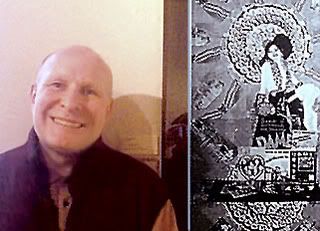
Visit: A Tale of Two Movies
Weather: The Flathead Valley was overcast yesterday, but the rain only fell when really dark low clouds roiled underneath the gray dome of the sky. It looks like we have the same conditions today.
In The Community: The Reiss family are a polite, fun-loving group of people. Meeting them at the reception at Leonard Lopp's old residence on Flathead Lake was a pleasure. Tonight is the opening of Winold Reiss: Artist of the Great Northern Railway at the Hockaday Museum of Art. We couldn't have put this show together without the good graces of Renata Reiss.
Media Watch: Yeek! While I drove to and from Lakeside for the reception, I listened to Happy Trails by Quicksilver Messenger Service -- the most elegant of the great 60's San Francisco bands.
I saw them in Salt Lake City when they were touring in support of their first album in 1969. "Numenor Productions" promoted the concert. Michael G. Cavanaugh was the MC. That team raised the culture level of SLC by several hundred percent between 1968 and 1972. Their problem was accomodating ever-increasing crowds, and finding venues where good, loud music could sound both loud AND good.
Quicksilver performed at the Valley Music Hall. (Now a large Mormon wardhouse.)
It was built as a theater-in-the-round, with a revolving stage. Quicksilver played their first set rotating at a steady rate, but before the second set started, Michael G. asked the audience to re-gather on the north side of the hall -- the band couldn't take the spinning anymore.
Quicksilver relied on Folk-Rock and popular blues for their songs. Either Gary Duncan or David Frieberg sang many folk-club standards like Robert Johnson's Walking Blues or Buffy St. Marie's Codine. They performed a few new tunes from their own album as well. A better-looking group of four young men would have been hard to find. Frontmen Duncan and Frieberg had full, dark, curly hair, each with a distinctive cut. Reclusive drummer Greg Elmore had long light locks, and a well-trimmed beard.
The visual and sonic centerpiece of Quicksilver Messenger Service was their lead guitarist, John Cippolina. He was thin and handsome, with long straight blond hair which cascaded over his shoulders and upper back. He never said a word, but stood next to a massive stack of Marshall amps, capped with brass horns, playing his Gibson, which did all the talking for him.
The climax of their second set in Salt Lake was an original song, The Fool, which was mostly solo Cippolina. He made a high, keening, slighly-dissonant sound that combined Jeff Beck's snarling overdrive distortions with Jimi Hendrix's poetic sensuality on his wah-wah pedal. I can truly say he made his guitar wail, but in a gentle, singing way.
Happy Trails is almost all live tracks recorded over the weekend of my 20th birthday in San Francisco. My best friend Jon Ludwig was in the audience for one of these performances, which made the album doubly special, since he had seen them with me in Salt Lake earlier the same year. ("I saw QUICKSILVER over Thanksgiving," he bragged, one cold December day on the steps of the University of Utah library.)
The album is built on two of Bo Diddley's most famous jams -- Who Do You Love, and Mona. There's good rhythm, bass, and rolling drums ,of course, and the largely-baritone singing is alright, but Cippolina's guitar is the main show -- almost 40 minutes of plaintive, screaming hard-rocking, ultra-boosted guitar in the hands of an electronic wizard.
It would also be the LAST album of it's kind. Quicksilver originally formed as songwriter Dino Valenti's band. Why he was missing from their first two albums is still a mystery to me, but Duncan later left the group to perform as a duo with Valenti, so they toured as a trio for awhile. An album called Shady Grove landed in the record stores, like a wrecked oil tanker, with Frieberg, Elmore, and Cippolina, definite, credited vocals by Duncan, and a new soloist -- prolific English studio pianist Nicky Hopkins. (Who also toured with Jefferson Airplane and the Rolling Stones.) He tore up the second side of Grove with his composition Edward, The Mad Shirt Grinder, but Cippolina was almost invisible as a player. A situation which lasted throughout the rest of his recording career.
Dino Valenti officially (re)joined Quicksilver, and they made two hit albums as a sextet -- Just For Love and What About Me. The Nixon administration banned the title single of the latter album from the airwaves for "promoting drug use."
(The dynamic flute of guest-musician Martin Fierro is enough to recommend this record to any hall of fame you may choose. It's a great song, too -- Valenti also wrote Get Together and Hey Joe.)
John Cippolina left the group around 1973, and died in the late 80's from Emphysema. He spent the last decade of his life jamming with other Bay Area musicians in various aggregations named "Copperhead," "The Dinosaurs," "Thunder & Lightning," etc.

No comments:
Post a Comment